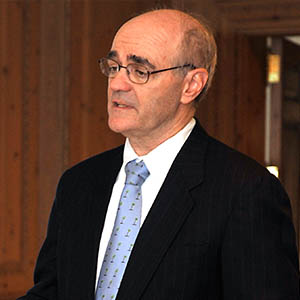What It Means For Global Economies & Corporates

Jump To Section
Deflation: What It Means For Global Economies & CorporatesWhat’s So Bad About Deflation?Who’s Most At Risk?
The decline in eurozone prices is the most dramatic example of deflationary pressures afflicting the globe. All eyes are now on European Central Bank chief Mario Draghi and his efforts to reverse that trend.
When the European Central Bank (ECB) announced its version of quantitative easing on January 21, the decision to buy €60 billion ($68 billion) a month in eurozone bonds came only days after prices in the region had slid for the first time in five years, raising the specter of a deflationary spiral.
Markets around the world reacted strongly. Not only does the eurozone account for 40% of global GDP, but to some extent the region’s problems reflect similar ones in much of the rest of the world. The appearance of price deflation in the eurozone and elsewhere has followed years of weak inflation in the wake of the financial crisis. In the eurozone itself, prices have risen at a rate well below the ECB’s annual target of 2% despite its efforts, however half-hearted, to spur economic growth.
Quantitative easing [QE] may or may not be aimed directly at preventing deflation from taking hold in the eurozone. But ECB president Mario Draghi and other policymakers clearly hope it will have that effect. The reason has to do with deflation’s pernicious effect on economic activity [see sidebar, page 18].
Japan, to be sure, has been experiencing a mild form of deflation for two decades and hasn’t descended into depression. But the country has been moving sideways economically for most if not all of that period. And China has in the interval eclipsed it as Asia’s most important economy.
But China is also slowing, dragging down much of the developing world and leaving the United States as the global economy’s sole growth engine, at least at the moment, a situation that International Monetary Fund managing director Christine Lagarde recently described as “lopsided” and perhaps unsustainable. After all, the dollar’s heady rise in recent weeks threatens to dampen US growth as well.
BOOSTING CONFIDENCE
From that perspective, quantitative easing by the ECB is simply the most dramatic example of a deflationary downdraft reflecting weak demand across the globe, and the recent plunge in commodity prices reflects that trend to some extent. As a recent report by HSBC put it, “Deflationary pressures were well established long before oil and other commodity prices fell, suggesting that the world economy remains in relatively poor shape.” The rest of the world is keenly watching Draghi’s efforts. Can he keep the region from sliding deeper into reverse? The jury is still out, and opinion about the potential effectiveness of the ECB’s asset-buying program is sharply divided.
The size of the bond-buying program announced by Draghi exceeded investors’ expectations and impressed many observers. Fergus McCormick, head of sovereign ratings for DBRS, a credit rating service based in Toronto, says Draghi’s move was dramatic. “It will help trust and confidence,” says McCormick, noting that the absence of confidence has been at least partly responsible for “chronic low demand” in the eurozone.
Tom Elliott, international investment strategist for advisory firm deVere Group, says the bond-buying program amounts to “a pretty hefty dose of medicine” for the eurozone.
But can monetary policy do much at this point to spur weak demand? After all, deflation in the eurozone stems from a lack of spending and is essentially a deeper version of the weak inflation that has been apparent there and in other developed-world economies for years.
The transmission channels [for monetary stimulus] are broken. We’ve been trying to solve a fiscal problem with monetary instruments.
~ Mark Blyth, Brown University
Indeed, inflation has been running below not only the ECB’s target but also that of the Federal Reserve and other central banks. And with interest rates at zero, there may be little more central banks can do to stimulate demand, since the private sector is more interested in paying down existing debt than adding more to its balance sheets. Meanwhile, governments elsewhere are politically inhibited from spending money on infrastructure, research or other public projects that could offset the dearth of private spending and thereby boost demand.
“The transmission channels [for monetary stimulus] are broken,” says Mark Blyth, a professor of political economy at Brown University. “We’ve been trying to solve a fiscal problem with monetary instruments.” He contends that’s impossible to do with rates at the so-called “zero lower bound,” adding, “If you’re in the middle of a recession, why would anyone borrow?”
Jump To Section
Deflation: What It Means For Global Economies & CorporatesWhat’s So Bad About Deflation?Who’s Most At Risk?
MORE DELEVERAGING NEEDED
However, Christian Odendahl, chief economist at the Centre for European Reform, a London-based think tank, contends that [loose] monetary policy alone could spur demand if it’s forceful enough to change inflation expectations. Up to now, Odendahl says, the ECB’s moves have been ineffective in that regard. In fact, the central bank raised interest rates both in 2008 and 2011, when it worried about a rise in prices.
That was a significant mistake, and observers are relieved that Draghi evidently believes so as well. The challenge now, however, is to convince companies and consumers that the bank will be aggressive enough to reverse the direction of prices. That conviction is critical, says Odendahl, because the actual stimulus provided by QE to the real economy will be more limited than it has been, for example, in the United States.
For one thing, European companies remain more dependent on banks for financing, so the health of the financial sector and its ability to lend is more important than if, like US companies, they relied on capital markets for finance. Yet many experts think eurozone banks remain too weak to do much lending.
“The problem with the eurozone is that there has been very little deleveraging, and it has not fixed its banks,” says Jan Dehn, director of research for Ashmore Research. In addition, ownership rates of homes and securities in the eurozone are much lower than they are in the United States or the United Kingdom, so there isn’t as much of a wealth effect to be gained from pushing up asset prices through bond purchases.

The ECB has also labored under the challenge of being the only vehicle for managing the eurozone economy because governments throughout the region are under political pressure to cut spending. In contrast, fiscal policy in the United States has been relatively loose, notwithstanding the so-called “sequester” that reduced budgets throughout the federal government, but only by a small amount.
As a result, there is more pressure on the ECB than there is on the Fed to raise inflation expectations. Odendahl is reassured somewhat by Draghi’s announcement that QE will be ongoing, much like the Fed’s third round of bond purchases, known as QE3. Until now, he says, “there was a much stronger commitment” on the part of the Fed to meet its inflation target, thanks to the US central bank’s so-called dual mandate, under which it is responsible for employment as well as price levels.
In contrast, the ECB’s mandate extends only to prices. But with deflation now a reality, the bank can move more aggressively to raise expectations. This prospect assumes, of course, that Germany and other critics don’t prevent the ECB from doing so out of extreme fear of inflation or moral hazard—the concern that failing to punish debtors will encourage them to default. Draghi must realize, says Odendahl, that the ECB “is not Germany’s central bank.”
But other observers fear that such a realization won’t matter. Should inflation expectations rise significantly, says Blyth, “Germany will start screaming, ‘Weimar, Weimar,’” and together with its allies in Finland and the Netherlands, quite possibly stay Draghi’s hand.
Jump To Section
Deflation: What It Means For Global Economies & CorporatesWhat’s So Bad About Deflation?Who’s Most At Risk?
AUSTERITY ON THE ROPES
Still other observers believe the ongoing debt renegotiations between the ECB, EU and the IMF, collectively known as the Troika, and the new anti-austerity government in Greece could help change the climate in Europe. Even if Greece compromises, its electoral success and pointed criticism of austerity could influence the outcome of elections in other countries, including Spain, Portugal and Ireland. “With austerity proving detrimental to growth,” notes McCormick, “the appetite to get reforms through is clearly diminishing.”
And that could scare Germany into backing off from demands for more austerity measures, which critics contend are self-defeating. “You end up cutting your nose off to spite your face if you end up with deflation,” McCormick points out, since countries’ ability to pay off their debts falls with declining economic activity. He adds that European policymakers have forgotten the lessons of the Great Depression by failing to realize that.
As Odendahl sees it, “We’ve been talking a great deal about competitiveness, but much less so about demand. That shift should have happened already.” He worries that the ECB has awakened too late to that reality. But he says he’s more optimistic than most that the resulting devaluation of the euro as a result of QE will help.
Odendahl contends that fears of a global currency war are overstated, given that most countries aren’t pursuing truly mercantilist policies but merely trying to stimulate demand, and that the US economy still isn’t tied so deeply into world trade to make the resulting increase in the dollar’s value a threat to the US recovery. In sharp contrast, Ashmore’s Dehn thinks the dollar is hugely overvalued.
But even if less austerity would help reverse the course of prices in the eurozone, many observers doubt it’s politically possible. “It’s politically unlikely for all sorts of reasons,” says Kevin Logan, chief US economist for HSBC. “That’s one reason rates are so low.” Adds McCormick of DBRS: “I don’t see any way out of making labor and product markets more competitive.”
Until that happens, the economy remains dependent on monetary policy to keep deflation at bay. And while much of the financial markets reacted with glee to Draghi’s announcement of QE, prices of futures contracts on sovereign bonds barely budged. By that measure, says Dehn, “inflation expectations didn’t change much.”
For that reason, Odendahl believes Draghi should increase the ECB’s inflation target to 4% from 2%, although Germany is likely to complain loudly over such a move. But how can a central bank generate confidence that it will create inflation when its toolkit is so noticeably depleted? “That’s exactly the problem,” says Odendahl.
In normal times, he notes, all a central bank has to do to stimulate demand is lower its short-term interest rate. But these aren’t normal times. Adds the economist: “It’s very dangerous when a central bank loses that ability.”
HSBC contends that a new global accord like the so-called Plaza and Louvre Accords of the mid-1980s, in which currency interventions were used to try and stabilize markets, is necessary to correct the imbalances dogging growth. Ideally, the bank’s economists say, a successful accord would do three basic things: The United States would reprise its former role as consumer of last resort by agreeing to offset a stronger dollar with domestic monetary and fiscal stimuli, including a decision to keep policy rates lower for longer. China would attempt to grapple with an excessively high level of domestic household savings by opening up capital markets and, in the process, boosting consumer demand. Germany would raise its retirement age considerably to encourage Germans to save less, paving the way to a sustained reduction in the German current-account surplus.
But HSBC contends such an accord is unlikely in the current political climate. That leaves the world hoping Draghi and his counterparts elsewhere can regain their ability somehow to conjure higher inflation.
Jump To Section
Deflation: What It Means For Global Economies & CorporatesWhat’s So Bad About Deflation?Who’s Most At Risk?
WHAT’S SO BAD ABOUT DEFLATION?
In contrast to inflation, where the general level of prices rises, encouraging consumption and investment, deflation discourages both, as savers hoard cash with the expectation that prices will fall, and their unwillingness to spend causes prices to do just that. The result is a downward spiral in activity, which, if severe enough, can lead to depression, as was seen throughout much of the world in the 1930s.
“The worry is if there’s a widespread decline in activity,” observes Kevin Logan, chief US economist for HSBC. “We’re on the edge of it.”
Some observers distinguish between “good” and “bad” deflation and point to the positive impact of falling oil prices as an example of the first, at least to the extent that the decline puts more money in the hands of consumers and encourages them to boost their spending. The US Federal Reserve has embraced that view, at least in its public pronouncements.
To the extent oil’s price decline is related to demand, it is mostly an effect rather than a cause of deflation. Still, there’s concern that it can feed deflation as well by putting downward pressure on manufacturers’ prices.
In that sense, the distinction between good and bad deflation may ultimately be a false one. “People are right to be concerned about deflation,” concludes Fergus McCormick, head of sovereign ratings for credit rating firm DBRS.
Jump To Section
Deflation: What It Means For Global Economies & CorporatesWhat’s So Bad About Deflation?Who’s Most At Risk?

WHO’S MOST AT RISK?
Which sectors of the economy are most threatened by deflation? The list is long, according to Kevin Logan, chief US economist for HSBC.
As he sees it, the first victims are consumers and companies in debt, as deflation increases its value while hurting their ability to service it. Retailers holding inventory also suffer, says Logan, as its value declines. Third, he says, industrial and commercial companies find themselves at risk, as producers of capital goods see their prices fall faster than wages.
That’s already been seen most clearly, he notes, in the oil sector and among suppliers to the industry, such as steel companies and capital goods makers. Caterpillar, for example, recently forecast that its revenues in 2015 would decline by 9% from last year’s because of the decline in oil prices. In addition, says Logan, producers of final products begin to suffer as their inventories become worth less.
Finally, deflation hits banks as they experience loan losses and can’t provide credit even to good borrowers. Logan notes that the same thing can happen in recessions. But with deflation, he says, the effect is “slower and more prolonged.” What can companies themselves do about deflation? Reducing prices may help them become more competitive and gain market share, but margins will suffer, as wages are slower to fall. And so the move ultimately eliminates profits.



